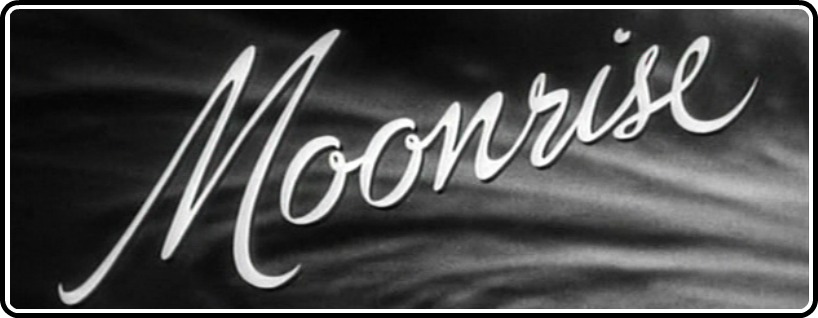There are opening sequences, and then there is the opening of director Frank Borzage’s 1948 unsung masterpiece, Moonrise. Most pictures follow one of two camps. First, you have the films that set the viewer up with every aspect one needs to know about its world. Establishing shot after establishing shot, introducing us to the characters and/or the universe that they inhabit. Then there are the films that have little interest in that, instead thrusting the viewer into the middle of an action taking place in this said world, involving characters you’ll learn more about as the picture goes.
And then there’s Borzage’s masterpiece. A film noir unlike any you’ve ever likely seen, the brooding and lyrical series of shots that spark this 86-minute stunner do everything, in theory, an introduction should. Ditching the world building in any fashion other than purely stylistic and aesthetic, the viewer becomes privy to every aspect of our lead character that matters one bit.
The film tells the story of Danny Hawkins, a man who we first see as a young child crying in his bed, following a smash cut from the apparent hanging of his father. Convicted of and hung for murder, Danny’s father is the subject the young boy finds to be the toughest to deal with in his youth, as it becomes the reason for seemingly constant bullying from other schoolmates. However, it doesn’t stop there. Now a full grown man, Danny is still being accosted by various people about the sins his father committed, and it is his response to one bully’s greatest provocation that thrusts this film into being like the recently fired bullet-into-the-sky it truly is.
Best known for films like his breathtaking adaptation of A Farewell To Arms, Borzage’s rain soaked, murky noir is possibly his final truly great achievement. Aesthetically, the film is entirely encompassed by its opening collection of frames. The black and white photography here from cinematographer John L. Russell is evocative and of the highest contrast, with its use of light and shadow instilled from the very opening shot. The hanging sequence is told entirely through shadow, and with our first cut being from a hanging man in shadow to a baby crying with a toy, again in shadow, seen hanging above its head, the mood and atmosphere, as well as the film’s central theme, are introduced barely ten seconds into the actual picture.
A classic tale of a son dealing with the sins of his father, as well as a burgeoning romantic relationship that itself needs to deal with the repercussions of those sins, the film is as evocative and entrancing as any noir you could think of. A somewhat Southern Gothic-style take on the genre, the film takes the noir out of the city only to implant it in the only place on this planet more damp and murky, a backwood’s swampland, and lets the characters, themes and true-blue melodrama breath out of every pore. A beautiful tale of finding love through adversity and one man’s attempt at previously impossible to find redemption, the film finds Borzage at his most lyrical and cinematically playful, be it the opening sequence or a rather breathtaking chase sequence that caps off this menacing picture. A beautiful example of the power of mise-en-scene, this film may subvert the noir trappings by ending as a rather optimistic picture, but it’s so visually enthralling and the mood here is so ever present that it becomes something entirely its own. A noir by way of Douglas Sirk, or a Sirkian melodrama seen through the eyes of a Fritz Lang (who was always an influence on Borzage), there’s no real shock that this picture has gone on to influence directors like Wes Anderson, whose Moonrise Kingdom shares more than just one word of its title with this beautiful feature.
Performance wise, the film is absolutely supreme. Dane Clark stars here as Danny Hawkins, and while his character is a rather run-of-the-mill noir lead, his performance is fantastic. Brimming with energy and vitality, the character could be played up as most melodrama leads are, but instead Clark balance’s the character’s dramatic past with a style fitting of this noir narrative and the film’s aesthetic. Opposite him is his love interest Gilly Johnson, played beautifully by Gail Russell. The two have fantastic chemistry, and their relationship feels real and true. Toss in work by names like Lloyd Bridges and Harry Morgan, and you have a film that I chock full of really solid performances, despite being a film seemingly driven by aesthetics and atmosphere.
Currently unavailable on DVD and Blu-ray, the film needs to be given the justice it so richly deserves on those formats. With Criterion currently (at least based on their Hulu page) holding the rights to Borzage’s wonderful History Is Made At Night, this would seem like a perfect fit as a second release opposite that great little picture. A scholarly commentary would be wonderful (say any of Criterion’s team of noir experts or an author like Michael Richardson who has written on the film’s relationship to surrealism), as would a supplement on the film’s potential restoration and its connection to both noir and melodramatic tropes. Toss in an interview with someone like Wes Anderson, and you could really have a superb release of a picture that needs to be seen by more people. A real unsung masterpiece, Moonrise is more than fitting of that almighty Criterion “C.”




Yes! I saw half of this movie (I fell asleep, it was late) just before it expired off Netflix instant. Was blown away by what I saw. Would definitely buy this.